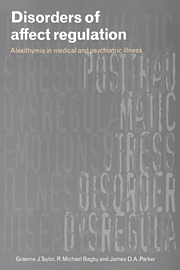Book contents
- Frontmatter
- Contents
- Foreword
- Acknowledgments
- Acknowledgment of permission for use of material
- Introduction
- 1 The development and regulation of affects
- 2 Affect dysregulation and alexithymia
- 3 Measurement and validation of the alexithymia construct
- 4 Relations between alexithymia, personality, and affects
- 5 The neurobiology of emotion, affect regulation, and alexithymia
- 6 Somatoform disorders
- 7 Anxiety and depressive disorders and a note on personality disorders
- 8 Substance use disorders
- 9 Eating disorders
- 10 Affects and alexithymia in medical illness and disease
- 11 Treatment considerations
- 12 Future directions
- Appendix
- References
- Index
Foreword
Alexithymia: the exception that proves the rule – of the unusual significance of affects
Published online by Cambridge University Press: 21 September 2009
- Frontmatter
- Contents
- Foreword
- Acknowledgments
- Acknowledgment of permission for use of material
- Introduction
- 1 The development and regulation of affects
- 2 Affect dysregulation and alexithymia
- 3 Measurement and validation of the alexithymia construct
- 4 Relations between alexithymia, personality, and affects
- 5 The neurobiology of emotion, affect regulation, and alexithymia
- 6 Somatoform disorders
- 7 Anxiety and depressive disorders and a note on personality disorders
- 8 Substance use disorders
- 9 Eating disorders
- 10 Affects and alexithymia in medical illness and disease
- 11 Treatment considerations
- 12 Future directions
- Appendix
- References
- Index
Summary
the heart has its reasons that reason knows not of.
Pensées: PascalThe work of these authors represents a signal contribution to the study of affects, emotions, and feelings, whether from the perspective of empirical research or for its clinical application to psychoanalysis and psychotherapy. Alexithymia, the construct they have nominated to represent a cluster of deficits in the capacity to process emotions from the cognitive perspective, reveals by its cognitive processing failure its healthy, intact counterpart in the normal individual and thereby helps illuminate the unusual significance of emotional life for all of us. Advances in developmental psychology, neurobiology, infant development research, trauma research, new concepts of personality development, and newer concepts in psychoanalysis have all contributed to the evolution of a new and distinct entity, that of self-regulation in general and of affect regulation in particular. In regard to the latter it should be understood that one's ability to regulate one's affects is paired in turn with the need to allow these affects to regulate one's thinking and behaviour.
The role of affects in psychoanalytic theory has evolved over time from Freud's early discharge model and, as such, as a step–child to the instinctual drives, to its presently emerging status as subordinating the drives within the broad sweep of its new found relevance. In this new conceptual model, dysregulated emotions escape from the individual's self–regulating, self–organizing reciprocal feed–back loop and may instead pathologically alter biopsychosocial systems at random.
- Type
- Chapter
- Information
- Disorders of Affect RegulationAlexithymia in Medical and Psychiatric Illness, pp. xi - xviiiPublisher: Cambridge University PressPrint publication year: 1997
- 4
- Cited by



